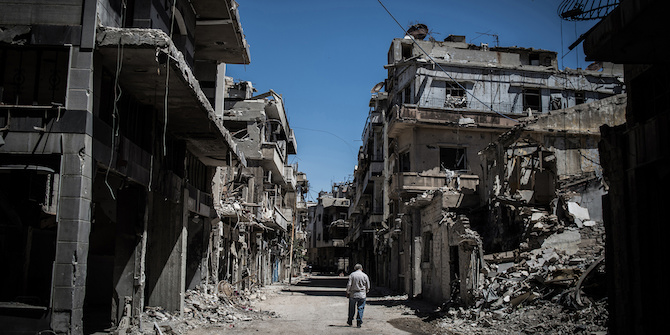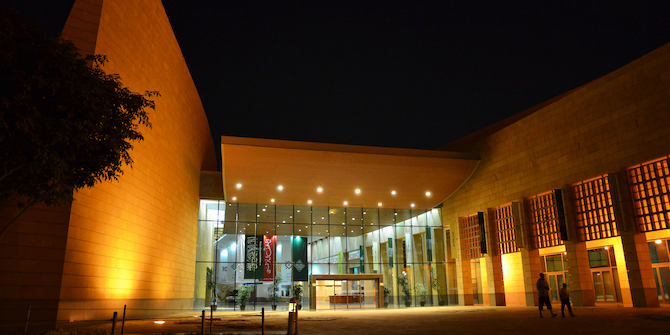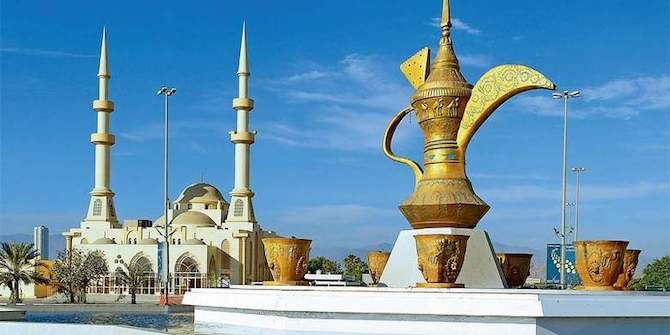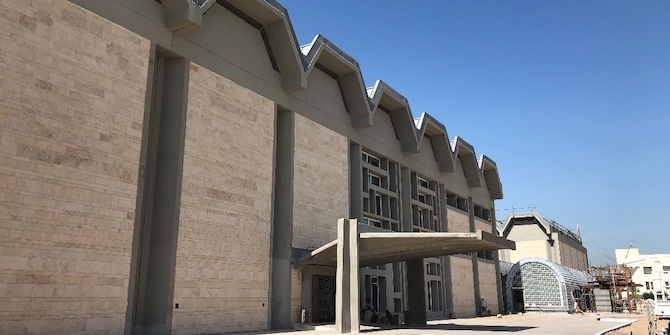by Jaclynn Robinson

Introduction
In order to understand how displaced Syrians are adversely impacted by war, it is worth recognising the gendered vulnerabilities they face. These vulnerabilities have been compounded by war and stand to negatively impact their mental and physical wellbeing as a result of the trauma experienced.
There is increasing evidence that the effects of war can impact the mental and physical health outcomes of displaced persons as they process the experiences of war and migration. Within the context of Syrian refugees, research from the United Nations High Commissioner for Refugees (UNHCR) found that physical pain was associated with life in exile. These physical symptoms may be attributed to heightened emotions such as fear, anger, anxiety, sadness, or symptoms of post-traumatic stress.
If public policy officials gain a better understanding of the gendered vulnerabilities of Syrians, they can work with healthcare professionals to address early prevention and treatment methods, and with humanitarian agencies to provide targeted policy measures and on-the-ground support. Therefore, by addressing gendered vulnerabilities, it is possible to alleviate some of the mental health and physical health symptoms experienced by the Syrians, which would enable them to more effectively re-integrate into Syria, or migrate and acculturate into a host country.
The Fear of Persecution and Arrest Among Males
Military service is mandatory for all males in Syria over the age of 18 years old for a period of 18 months, with the potential to be called to serve until the age of 42. Males enrolled in postsecondary school have the ability to postpone their service. Additionally, service may be postponed based on the number of sons per family who are volunteers, reservists, or already serving their active duty.
As a result of the war, postponement has become increasingly more difficult for male students due to the disruption of their postsecondary studies. As the call to arms from the Syrian government looms in front of them, they often choose to demonstrate against the government or to flee from Syria. Older males also feel immense pressure to fight, if not for the Syrian government then for the opposition groups.
Once males make the decision to flee, the migratory journey is often difficult because of the potential for persecution, violence, robbery, or arrest. The likelihood of safe passage increases if they have families. Although safety ensues when they cross the border of a host country, often times the next hurdle is the stigma of being a Syrian male. This creates heightened feelings of sadness, anxiety, and perceived discrimination.
Without greater measures in place by public policy officials, male defectors displaced in Syria will continue to live in fear of persecution, arrest, torture, and death from government forces. Meanwhile, those that flee will continue to find it difficult to acculturate in a host country due to the stigma associated with them as potentially violent individuals or terrorists.
Outside nations can speak out against the atrocities committed against military defectors and place pressure or additional sanctions on the Syrian government to hold them accountable. Nations can also create public awareness on the plight of military defectors so that the stigma associated with Syrian males in host countries is reduced.
Lastly, humanitarian workers, mental health professionals, and healthcare providers can be educated on the vulnerabilities Syrian men face so as to provide greater emotional support, which stands to reduce physical health complaints and allows them to be more integral in society. This latter point is important because in a patriarchal society such as Syria, males are expected to be the primary financial provider. Not only does this serve to reduce long-term healthcare costs to the host country, but once a refugee is approved to work, it creates more production in the workforce.
The Effects of War on Women’s Health
The war in Syria has fractured the lives of women. Alongside the hardships of a disrupted postgraduate education and career, women worry about providing food, medication, and clothing for their children. They also express concern about gender-based violence (GBV). This type of violence includes rape, forced prostitution, sexual exploitation, physical violence, forced marriage, and trafficking.
For a woman who is single or head of the household, there is a higher likelihood of this occurring due to factors such as a lack of financial capital, male protection, and social and legal status. To compound matters, once they leave Syria, the threat of GBV remains in refugee camps.
If GBV occurs, it is often not spoken about for fear of shame or stigmatisation from their husbands, family members, or the community, it being more important to preserve the family honour. However, if women do not speak about it to mental health and healthcare providers, they run the risk of untreated sexually transmitted diseases, unplanned pregnancies, and increased mental distress from the trauma itself.
Early intervention and awareness is key. In Lebanon, women affected by GBV have up to 100 percent of their medical costs covered. In Turkey, changes to healthcare have led to universal coverage and greater access to services for Syrian women, while in Jordan the UNHCR covers the cost for refugees affected by GBV who are unregistered or are referred from the Za’atari camp.
Public policy officials can provide further support by partnering with the World Health Organization and host countries’ health departments to gather data on facility capacity, staffing, and patient admission rates. This data can provide information on where to either increase or divert the current budget to cover additional mobile clinics, female staff, medication, and technology for women’s health services. Moreover, public policy officials may seek to follow in the footsteps of the World Food Programme and invest in blockchain technology, which could be used for prescriptions costs or insurance co-payments.
Conclusion
Now in its seventh year, the Syrian refugee crisis has impacted 13.1 million Syrians in Syria, and over 5.4 million Syrians in host countries outside of Syria. In order to provide targeted and effective support, it is important to understand the gendered vulnerabilities that impact them. This increased cultural sensitivity stands to support Syrians emotional and physical wellbeing, and as a result, their ability to reintegrate into society as healthy, engaged, and productive citizens. This stands to prevent cultural genocide on a community level and socioeconomic disintegration at an international level.
This is an abridged version of a paper given at a conference on Responses to Displacement in the Middle East, held at the LSE on 30 November 2017. See below for the full list of papers.
Jaclynn Robinson Ph.D., is an international psychologist and criminologist who serves as a workplace consultant at the global management consulting company, Gallup. At Gallup, she provides performance coaching and strategic advice to individuals, leaders, and teams. In addition to her consultative work, her research interests include the learned behaviours of terrorism and the lived experiences of refugees, with specific interest in refugees pre- to post-migration experiences. She tweets at @NineMusesProd
In this series:
- Introduction by Zeynep Kaya
- The Politics of Return in post-ISIS Iraq by Kyra Luchtenberg
- Going Back or Staying Better: Processes of Return After Displacement due to ISIL by Nesreen Barwari
- Returnees in Syria: Sustainable reintegration and durable solutions or a return to displacement? by Schadi Semnani
- Breaking the Vicious Circle: Exploring Alternatives to Current Responses and Solutions to Internal Displacement in Yemen by Stean Auguste Tshiband
- Iraq after the Islamic State: Displacement, migration and return by Irene Constantini
- Displaced and on the Move Again: Decision-making among IDPs who migrate to Europe by Megan Passey
- Violence, Insecurity and the (Un)making of Rukban Camp by Suraina Pasha
- Between International Influence and Domestic Politics: The case of the refugee control policy towards Syrian refugees in Lebanon by Zad El Hage Sleiman
- Fleeing Home at Home: Internal Displacement in Homs, Syria by Ammar Azzouz and Irit Katz
- Chaos and Fear: Governmental strategies to hinder national and international humanitarian responses to internal displacement in Turkey by Eva Jones
- Administrative Violence and Palestinian Displacement in West Bank Area C by Mustafa Fatih Yavuz
- Local Integration in the Context of Protracted Displacement Inside Syria by Simon Verduijn







